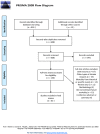The use of climate information to estimate future mortality from high ambient temperature: A systematic literature review
- PMID: 28686743
- PMCID: PMC5501532
- DOI: 10.1371/journal.pone.0180369
The use of climate information to estimate future mortality from high ambient temperature: A systematic literature review
Abstract
Background and objectives: Heat related mortality is of great concern for public health, and estimates of future mortality under a warming climate are important for planning of resources and possible adaptation measures. Papers providing projections of future heat-related mortality were critically reviewed with a focus on the use of climate model data. Some best practice guidelines are proposed for future research.
Methods: The electronic databases Web of Science and PubMed/Medline were searched for papers containing a quantitative estimate of future heat-related mortality. The search was limited to papers published in English in peer-reviewed journals up to the end of March 2017. Reference lists of relevant papers and the citing literature were also examined. The wide range of locations studied and climate data used prevented a meta-analysis.
Results: A total of 608 articles were identified after removal of duplicate entries, of which 63 were found to contain a quantitative estimate of future mortality from hot days or heat waves. A wide range of mortality models and climate model data have been used to estimate future mortality. Temperatures in the climate simulations used in these studies were projected to increase. Consequently, all the papers indicated that mortality from high temperatures would increase under a warming climate. The spread in projections of future climate by models adds substantial uncertainty to estimates of future heat-related mortality. However, many studies either did not consider this source of uncertainty, or only used results from a small number of climate models. Other studies showed that uncertainty from changes in populations and demographics, and the methods for adaptation to warmer temperatures were at least as important as climate model uncertainty. Some inconsistencies in the use of climate data (for example, using global mean temperature changes instead of changes for specific locations) and interpretation of the effects on mortality were apparent. Some factors which have not been considered when estimating future mortality are summarised.
Conclusions: Most studies have used climate data generated using scenarios with medium and high emissions of greenhouse gases. More estimates of future mortality using climate information from the mitigation scenario RCP2.6 are needed, as this scenario is the only one under which the Paris Agreement to limit global warming to 2°C or less could be realised. Many of the methods used to combine modelled data with local climate observations are simplistic. Quantile-based methods might offer an improved approach, especially for temperatures at the ends of the distributions. The modelling of adaptation to warmer temperatures in mortality models is generally arbitrary and simplistic, and more research is needed to better quantify adaptation. Only a small number of studies included possible changes in population and demographics in their estimates of future mortality, meaning many estimates of mortality could be biased low. Uncertainty originating from establishing a mortality baseline, climate projections, adaptation and population changes is important and should be considered when estimating future mortality.
Conflict of interest statement
Figures
References
-
- IPCC, 2013a: Summary for Policymakers In: Climate Change 2013: The Physical Science Basis. Contribution of Working Group I to the Fifth Assessment Report of the Intergovernmental Panel on Climate Change Change [Stocker TF, Qin D, Plattner GK, Tignor M, Allen SK, Boschung J, Nauels A, Xia Y, Bex V, Midgley PM (eds.)]. Cambridge University Press, Cambridge, United Kingdom and New York, NY, USA, pp. 1–30.
-
- Collins M, Knutti R, Arblaster J, Dufresne JL, Fichefet T, Friedlingstein P, et al. 2013. Long-term Climate Change: Projections, Commitments and Irreversibility In: Climate Change 2013: The Physical Science Basis. Contribution of Working Group I to the Fifth Assessment Report of the Intergovernmental Panel on Climate Change [Stocker TF, Qin D, Plattner GK, Tignor M, Allen SK, Boschung J, Nauels A, Xia Y, Bex V, Midgley PM (eds.)]. Cambridge University Press, Cambridge, United Kingdom and New York, NY, USA, pp. 1029–1136
-
- IPCC, 2013b: Annex I: Atlas of Global and Regional Climate Projections Supplementary Material RCP8.5 [van Oldenborgh GJ, Collins M, Arblaster J, Christensen JH, Marotzke J, Power SB, Rummukainen M, Zhou T (eds.)]. In: Climate Change 2013: The Physical Science Basis. Contribution of Working Group I to the Fifth Assessment Report of the Intergovernmental Panel on Climate Change [Stocker TF, Qin D, Plattner GK, Tignor M, Allen SK, Boschung J, Nauels A, Xia Y, Bex V, Midgley PM (eds.)]. Cambridge University Press, Cambridge, United Kingdom and New York, NY, USA.
-
- Huang C, Barnett AG, Wang X, Vaneckova P, FitzGerald G, Tong S. 2011. Projecting future heat-related mortality under climate change scenarios: A systematic review. Environ Health Perspect 119:1681–1690 doi: 10.1289/ehp.1103456 - DOI - PMC - PubMed
Publication types
MeSH terms
LinkOut - more resources
Full Text Sources
Other Literature Sources


